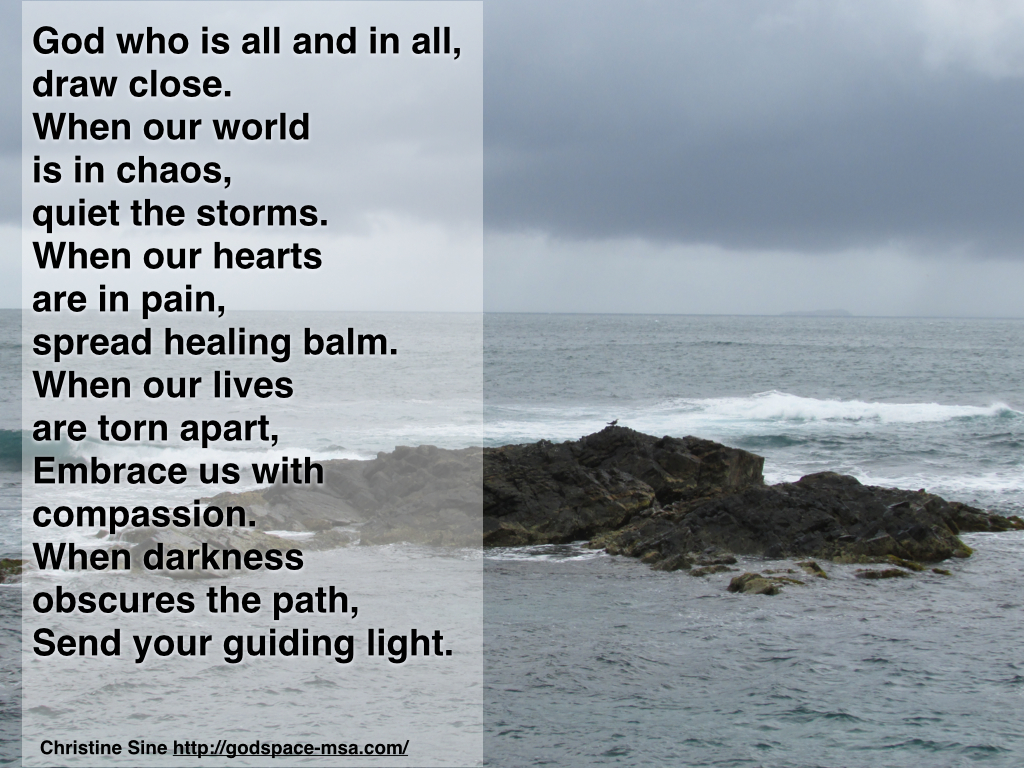Earlier this week I reposted this link to a video meditation called A Good Day by Brother. Its popularity encouraged me to post this video which is another beautiful meditation by Brother David Steidl-Rast accompanied by Gary Malkin’s inspired music, looks towards the possibility of our world uniting in an overflow of gratitude.
If you enjoyed this you might like to visit Gratefulness.org/ where you can find more of Brother Steidl-Rast’s meditations.
Have you ever wondered what air conditioning has to do with Christian faith? I’ts obviously not something that Jesus thought about so why should we get concerned? A couple of years ago, I read this fascinating article on conversation at Alternet about whether we can and should live without air conditioning. The article Air Conditioning is Terrible for the Earth – Here’s How To Live Without it is well worth a read and got me thinking about my faith and the unexpected responsibilities it places on me over the summer months.
We are just back from New York City. Yesterday the temperature was well into the nineties. And here in Seattle we are expecting 90s over the weekend, something that has Seattlites complaining about the heat and dashing out to buy fans and air conditioners. So it seems a good time to think about this.
This is not a topic that most Christians spend time thinking about. The Bible belt is the biggest offender when it comes to over use of air-conditioning. And many of you may think that because I live in the Pacific NW where the weather is rarely warm enough to bother with air conditioning, I have little to say. However I spent most of my life in Australia or working in the tropics – living on an unair-conditioned ship with a single fan wafting a few stray so I feel I am more of an expert than you would expect.
Sizzling summer temperatures have all of us thinking about how to keep cool. But as as the temperatures drop we often forget about it. After all when the temperatures are in the 80s we are not likely to overstress the electrical grid with our power usage. But then again summer is just beginning and according to the Alternet article:
The air-conditioning of America’s homes, businesses schools, and vehicles causes the release of greenhouse gases equivalent to 400 million tons of carbon dioxide annually. air conditioning
There are a number of ways to cut down the inside temperature of our houses without using energy intensive air conditioning as the Alternet article suggests – some simple, some not so simple. So let’s start with some of the simple ones first:
- Plant deciduous trees on the south side of the house in the northern hemisphere on the northern side of the house in southern hemisphere.
- If you are still waiting for those trees to grow close windows and curtains during the day in rooms that get direct sun; open windows and doors at night.
- Make sure roof and walls are well insulated. Seal gaps around windows and doors so that heat cannot enter.
- Move the air – use fans can decrease the temperature by 5 – 8 degrees and opening windows for flow through air will similarly reduce temperatures.
- Wear clothing made of materials that breathe – like cotton or wool (yes wool is warm in winter & cool in summer). Loose fitting garments are better than tight fitting. Also get rid of those shoes or wear sandals. Feet are good heat exchangers.
- Wet down your clothing with a spray bottle and stand in front of a fan, wear a wet hat or wipe down the back of your neck with a wet cloth.
- Drink plenty of water (not alcohol or sugar drinks)
- Turn off any unnecessary appliances. All electrical appliances generate heat; particularly refrigerators and TV’s. Plasma screens in particular are known to create a great deal of heat, to the point that some refer to them as space heaters. Other huge heat producers are clothes dryers and dishwashers so take advantage of the cool evenings to hang your clothes outside or put them on a drying rack in front of your fan and take advantage of the cooling flow of air.
- Replace your incandescent lights with LED bulbs.
- In dry climates, replace traditional air conditioning units with evaporative (swamp or desert) air conditioners.
- Retreat to the basement if you have one – it will be the coolest part of the house.
And now for some more challenging solutions:
- Build houses with lots of overhang – porches, verandas and eaves all make a difference in the heat
- Learn from the termites. Here is an amazing building design in Zimbabwe based on the air cooling system found in a termite hill.
- Build an underground house and cut do away with air conditioning costs.
- Put a green roof on your house
- Build on stilts. This increases air flow through the house though if you live in a place that gets cold in the winter this may not be very helpful.
- Get involved in your community and advocate for the replacing of asphalt with parks and green spaces. Cities absorb more solar energy during the day and are slower to release it after the sun sets, making for uncomfortable nights and no real relief from the heat. And because they haven’t cooled down as much overnight, mornings are warmer and the thermometer goes right back up when the sun starts beating down the next day. Green areas help keep the temperatures down.
I am sure that there are lots of other ideas that I have not thought of here so let me know – how do you keep cool in the hot weather?
The MSA Team, Board and a few close friends are in a process of discernment. The process we are using is called backcasting, which we combine with our usual discernment process to help us get a sense of what God is wanting to accomplish.
Our questions are: What could MSA look like in five years time? And then what do we need to do this year, next year, in 2016, 2017 2018 to accomplish that. Combining our usual discernment process with these questions is a very effective way to help us look forward and I thought that you would be interested in this and the way that we use this process. It has become such an essential part of who we are as an organization that we know it is part of what we want MSA to be in five years time. I think that it should be part of any discipleship process.
This is an exciting time that helps draw us closer to each other and to what God wants to accomplish in and through us. One of the wonderful aspects of this process is that it gives everyone involved both a sense of ownership and it draws us together as a team that is focused on Christ rather than on our own agendas. We see it as an opportunity to mentor each other and to integrate our spiritual practices with our work.
Using a process like this also helps to slow us down, something that many of us struggle with as we live in such a fast moving society, but we realize that slowing down is actually what we need more than anything else. To be honest as I reflected on this I realized that we are probably not wasting time at all – in the long run we are probably saving time. The more time we spend focusing on God and God’s agenda the more effectively we will be at doing things that have eternal value.
In this process we always start with a centering prayer, which I first learnt about when reading Basil Pennington’s book Centering Prayer. I often use a breathing prayer for this process which helps all of us relax and let go of all that distracts us from God.
Our second step is checking in. We ask each other. What were the high and low points of the last week? Where did you feel close and distant from God? We then ask What are you looking forward to in the week ahead? What are you not looking forward to? We find that asking these questions sensitizes us to each others joys and struggles so that when we get down to business we are aware of the pressures on each other’s lives and how these could impact our work and our decisions. And in case we are not taking each other seriously enough we then ask these question What are the common themes? and How could these impact our work in the season ahead?
Reflecting on where God is active and how God is moving in our personal lives first and using that as the foundation for our other work focuses us on relationships rather than tasks. It also strengthens our faith as we recognize the presence of God is all we do and take notice of the threads of God’s activity throughout the day. It is amazing how often what God wants to guide us into in our business flows out of this personal sharing time.
The next important step, which can be challenging as so easily move back into a secular business mode of operation, is to look at our business agenda in the same spirit of attentiveness, recentering as needed to keep us attentive to God’s spirit. Noticing the God moments and the flow of God’s spirit during the meeting and offering our efforts to God, bringing us back to the center is an important final step.
We appreciate your prayers and your encouragement as we work through this process.
A couple of days ago in my post Embracing the Wild Hospitality of God. I talked about how even the brambles and pests in our gardens can be unexpected blessings from God. Since then I have found myself thinking a lot about the aspects of my personality that I once thought of as curses that I now recognize as blessings.
For instance I have a photographic memory and absorb facts and figures like a sponge. My family found it embarrassing, my friends found it strange and men found me intimidating. I have lost count of the times I was told I thought like a man and not a woman. Often growing up I felt embarrassed, sometimes even ashamed of this aspect of my personality which so often kept me isolated and distanced from others. I tried to hide the uniqueness of who God had created me to be. It was very definitely a curse and not a blessing from my perspective.
Now I realize that so much I have accomplished in my life would have been impossible without that gift which I had for so long regarded as a curse. My ability to gather and process facts was really important as I developed the medical ministry for Mercy Ships. It has been just as important as I put together resource lists for this blog and even more important as I read and process the huge number of books I read every week. Even as I garden and write prayers and books, it is my memory and ability to retain and process facts and figures that has provided a platform for what I do.
Sometimes I feel that I suffer from verbal diarrhoea and that the quantity of what I process and write about is a little overwhelming for some. One of my friends jokingly told me one day that I need to develop a new blog – Godspace Light. But that no longer bothers me. I know that this is a gift that God has given me and I am grateful for it and humbled by the ways that God has used it to bless the lives of others.
What this makes me realize however is that all of us are blessed with gifts from God that we often begin seeing as curses. Maybe a disability like Tourette’s. Tom and I recently watched Front of the Class about a young teacher who has tourette’s syndrome. At the end of the film he too gives credit to his “curse” for being a wonderful gift in his life and making him all that God intends him to be.
Part of what prompted this post for me is talking to a friend of ours whose son has just been diagnosed as autistic. They were devastated, until they realized that the personality traits that labelled him as autistic are actually much sort after in high tech businesses.
Perhaps your curse is being born into poverty, of being abused as a child, or having an addiction to alcohol or drugs. These too God can redeem and transform into gifts that God can use to bring into being that new world of wholeness and abundance that God is in the process of bringing into being.
Even the curse of the tower of Babel and the confusion of languages, depicted in the photo above, was redeemed by God at pentecost. And what fascinates me is that God does not redeem it by making people all speak the same language, God redeems it by maintaining language diversity but makes it possible for people to understand each other, something that I am sure adds much more richness to the kingdom of God.
So what do you think? My challenge to you today is to spend time in prayer and allow the spirit of God to identify your curse. What is it in your life that God wants to redeem and transform into a gift? Or what in your life has God already redeemed that you have never come back to God with gratitude and thankfulness.
 I wrote this prayer for the Light for the Journey Facebook page this week and find it keeps coming to mind as I watch the news that speaks of so much pain in the world. Pray it with me today.
I wrote this prayer for the Light for the Journey Facebook page this week and find it keeps coming to mind as I watch the news that speaks of so much pain in the world. Pray it with me today.
Today’s post in the series Hospitality – Opening Doorways to the Kingdom is written by Lynne Baab.
Lynne Baab’s recent book, The Power of Listening: Building Skills for Mission and Ministry , focuses on the many ways listening undergirds congregational life. She discusses many obstacles to listening, one of which she explains here. Lynne is a Presbyterian minister and lecturer in pastoral theology. Visit her website at www.lynnebaab.com.
I view listening as a key skill for hospitality in all its forms. Imagine a traditional hospitality setting: you are offering a traveler a place to sleep. “What do you need right now?” you ask. “A shower? A nap? The wifi password? A cup of tea?” You listen to the response and try to meet the traveler’s need. In addition, you may need to listen to subtle cues that help you know what the traveler needs.
Meal times are another typical hospitality setting, and listening plays a key role in mealtime conversations. I have sat through many meals where one person is talking, talking, talking . . . taking up all the air time and dominating the conversation. And I have enjoyed many meals where the host or someone else draws people out and listens carefully. A world of difference!
The connections between listening and hospitality go far beyond lodging and meals, however. I have a very broad definition of hospitality as I described in an earlier post. I see hospitality as an open stance toward others, a receptivity to who they are and what they have to offer. I see hospitality as a welcome to others that can happen in a short conversation or a long-standing relationship. This kind of welcome and receptivity requires good listening skills and the willingness to stop talking long enough to hear deeply from the other.
One of the obstacles to this kind of listening comes from our fears that if we listen deeply and carefully to someone we disagree with, we will be communicating tacit agreement to their perspective. Imagine I have just met someone new in my workplace, and a few random comments she makes leads me to believe she practices a religion very different from mine. If I draw her out about her religious practices, will she think I agree with them? Or perhaps she expresses a political opinion diametrically opposed to mine. If I draw her out about her political convictions, will she think I give assent to them?
The authors of a communication textbook write, “There is a difference between understanding and agreeing with a speaker. We need to develop new psychological habits that encourage us to keep an open mind and a positive attitude to the motivation behind what is communicated to us orally.”[1]
These communication scholars might recommend language like this: “Tell me about X”(when X is the thing I profoundly disagree with). “Tell me what motivated you to get involved.” We indicate our openness to understanding what lies behind the other person’s commitment. We open ourselves to the other person’s story. At some point in the conversation we are free to say, “Wow, I don’t agree with the conclusion you came to, but it’s very interesting to see where your convictions came from. Tell me more about how you got there.”
As long as we believe that listening implies agreement, our ability to be truly hospitable to the people we meet will be truncated. We won’t listen well because we will be fearful that we will hear something we disagree with and that we won’t know how to respond. All of us can grow in believing that listening does not imply agreement, that understanding other people’s stories, motivations and thought processes will enrich us even if we disagree with them.
[1] Terry Mohan, Helen McGregor, Shirley Saunders, and Ray Archee, Communicating! Theory and Practice, 4th ed. (Sydney: Harcourt Brace, 1992), 417.
Today’s post in the series Hospitality – Opening Doorways to the Kingdom, is written by Mark Votava.
As I have lived at the Tacoma Catholic Worker for the past four years I have learned a lot about hospitality as a way of life together with others. I am learning to share life with people I did not think I had anything in common with. The particular house I live in is called The Guadalupe House and the primary function of its hospitality is proving showers, transitional housing, meals and mail to friends who struggle to have these basics needs met in their everyday lives.
- A weekly liturgy dinner for the poor
We have four meals every week together and on Tuesday nights we do a weekly liturgy dinner for the poor where our friends can come and share their spirituality with others in a nonjudgmental way. A lot of our friends live in shelters, cars or sleep outside. Some of our friends also have houses and apartments too. This is beautiful because it brings the poor and the middle class together in friendship and love.
- Finding the commonalities rather than our differences
At the dinner table everyone is equal as we find our commonalities in realizing that we all need to eat whether we have a lot of money or not. I am eating with folks of different races, languages, classes, ages. This has been so countercultural and beautiful to experience. The lesson I am constantly learning is to find the commonalities with others rather than our differences.
- Using our houses in a hospitable way
The Tacoma Catholic Worker has eight houses all within one block in our neighborhood. It is kind of like an urban village where the poor are welcomed and not shunned. We use our houses in a hospitable way where we live with others anywhere from several months to several years. We give our friends a place to work on their goals of getting income, work, housing, sobriety, reestablishing relationships with children and becoming healthy physically and mentally.
- Providing a refuge for someone struggling with immigration
There is an ICE detention center for immigrants close by and we recently have worked with an organization that helps get others out to work on their immigration. One of the rooms at The Guadalupe House is for someone coming from ICE. It is a blessing to provide a refuge for someone that is struggling with immigration and a new life in this country.
- Seeing Christ in the poor
I am learning so much from the Tacoma Catholic Worker. One thing our community constantly practices is seeing Christ in the poor by our compassion, love and hospitality in everyday life together. I see the Tacoma Catholic Worker as an expression of being the church together in our neighborhood where we live out the works of mercy with others who are hurting and lonely.
- Eating together and showing hospitality could change everything
The simple acts of eating together and showing hospitality in the place we live could change the body of Christ and the world around us. This is the most revolutionary thing I have ever seen and experienced. As I continue on in my journey here, the poor will continually teach me of Christ among us.
How can we practice hospitality as a way of life?
As an Amazon Associate, I receive a small amount for purchases made through appropriate links.
Thank you for supporting Godspace in this way.
When referencing or quoting Godspace Light, please be sure to include the Author (Christine Sine unless otherwise noted), the Title of the article or resource, the Source link where appropriate, and ©Godspacelight.com. Thank you!




